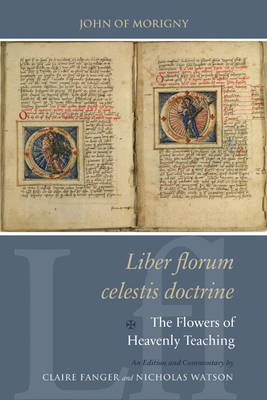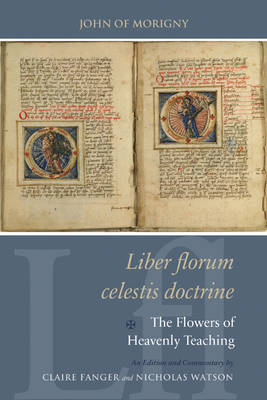
- Retrait gratuit dans votre magasin Club
- 7.000.000 titres dans notre catalogue
- Payer en toute sécurité
- Toujours un magasin près de chez vous
- Retrait gratuit dans votre magasin Club
- 7.000.0000 titres dans notre catalogue
- Payer en toute sécurité
- Toujours un magasin près de chez vous
Liber Florum Celestis Doctrine / The Flowers of Heavenly Teaching
John of MorignyDescription
This volume provides the first edition and systematic study of the Liber florum celestis doctrine by the Benedictine John of Morigny. Until recently this work was known only through a chronicle report of its burning at Paris in 1323, on the grounds that it revived a condemned ritual called the Ars notoria. However, it survives in three versions in more than twenty copies from across Europe, few of which indicate doubt as to its orthodoxy.
The Liber florum has at its core a Book of Prayers, written at the University of Orléans between 1301 and 1308, which models an angelic ascent to the court of heaven. The Book of Prayers promises infused knowledge of the liberal arts and other disciplines to operators who obtain the Virgin's license to use it. It also enables them to petition the Virgin for visionary dreams in which she may respond to specific questions.
After assuming a high-ranking position as provost of Morigny in 1308, John continued to elaborate his work. By 1315 he had added two versions of a Book of Figures, sending out new materials in instalments to a growing circle of followers, including secular priests as well as professional religious. He had also added a Book of Visions, which narrates his journey from sin to redemption as well as that of his sister, Bridget. Here he describes his first vision of the virgin Mary at Chartres, his later magical practices, his encounters with demons, and his ultimate rejection of magic arts under the Virgin's protection.
An intimate visionary collaboration between human and divine, the Liber florum will be of interest to all students of the middle ages, especially those interested in university learning, monasticism, liturgy, mysticism, visions, magic, and book history.
Spécifications
Parties prenantes
- Auteur(s) :
- Editeur:
Contenu
- Nombre de pages :
- 650
- Langue:
- Anglais
- Collection :
- Tome:
- n° 199
Caractéristiques
- EAN:
- 9780888441997
- Date de parution :
- 30-09-15
- Format:
- Livre relié
- Format numérique:
- Genaaid
- Dimensions :
- 163 mm x 236 mm
- Poids :
- 1202 g

Les avis
Nous publions uniquement les avis qui respectent les conditions requises. Consultez nos conditions pour les avis.






